The success of WeChat triggered the phenomenon of regional “super-applications”, but the super-application brought convenience and was accused of stifling competition.
Editor’s note: This article is from WeChat public account “iFeng Technology” (ID: ifeng_tech ), the author Xiao Yu.
WeChat leads the super app
The Nikkei Asia Review stated that the success of WeChat in China has inspired Asian companies to develop their own one-stop applications, triggering regional “super-applications”. However, while super-applications bring convenience to consumers, they are also accused of stifling competition. The operators do not allow other applications to challenge themselves. For example, WeChat has suspended the direct playback of short videos such as vibrato.
The following is the full text of the article:
Michael Xu is fascinated. Shortly after he returned to China to visit relatives in 2017, the Toronto game developer decided to fly more than half of the world to learn how to develop games for WeChat.
“WeChat is so popular in China,” he said in an interview with WeChat. The 28-year-old Chinese Canadian was used by his relatives to use WeChat to pay bills, chats, and takeaways. “Even my 88-year-old grandfather is proficient in using WeChat,” he said. “Grandpa has always used WeChat to call me and share photos and articles.”
Therefore, when Michael Xu decided to explore the Chinese game market last year, his first step was to participate in the WeChat program in Shanghai. “All Chinese are already on WeChat,” he said. “It’s much easier to play our games on WeChat than to ask users to download another app.”
His strategy highlights the absolute strength of WeChat. WeChat was developed by Tencent Holdings and has more than 1.1 billion users, mostly in China. If you integrate the US application of WhatsApp, Apple Pay, Uber, Facebook, Expedia and other applications, it is WeChat. The success of WeChat inspired Asian companies to develop their own versatile applications, triggering a regional “super-application” phenomenon.
Super Apps from China to Asia
Although no one has ever calculated the exact number of Asian super apps, they are spreading everywhere, including some of Asia’s most remote corners. Myanmar was only connected to the Internet in 2000, but has embracedA Zalo developed by Vietnam. Zalo was originally a chat tool and will soon offer shopping and electronic payment services. In India, the corporate group’s letter of truth announced earlier this year that it will launch an application with 100 services built in.
“In Asia, super-applications have become a way of doing business.” Visal Harnal, general partner of Silicon Valley venture capital firm 500 Startups in Singapore.
This phenomenon can be traced back to the emergence of emerging economies coincides with the onset of smart phones. Millions of people in emerging markets in Asia missed the PC era, but came directly to the era of smart phones, and the use of apps was their second habit.
At the same time, the multi-billion dollar application market has sparked fierce competition. According to data from the Ministry of Industry and Information Technology, in China alone, the number of applications exceeds 4 million, and it is still growing. Analysts pointed out that for enterprises, super applications help them attract users in massive software and lock them in.
Jakarta consultant Amalia Ayuningtyas is a vivid example. She originally downloaded the Indonesian super-application Go-Jek mainly for the purpose of fighting, and hopes to quickly pass the peak traffic. But with the Go-Jek vouchers, the 27-year-old consultant quickly tried other Go-Jek features,
Asia’s super apps
Now, Ayun Niyas uses the mobile wallet GoPay to pay for the taxi, use the take-away service GoFood to order the meal, and send the file through the courier service GoSend. Sometimes, she also books a massage through GoMassage and arranges housework through GoClean. When the balance of the call is not enough, she will use GoPulsa to recharge.
“I was born for Go-Jek.” Ayunningas said. She added that nearly 20% of her monthly spending is done through Go-Jek.
Go-Jek Chief Technology Officer Ajey Gore said at a recent conference in Hong Kong that Go-Jek is handling 2.5 million user requests at any time, which is still on its platform. A growing 21 services. “Once you have this size, you can do anything,” Gore said.
Super apps stifle competition?
However, the industry may have to pay for the convenience of the super application.The price. Some experts warn that the rise of super applications has hampered online competition and innovation.
For super applications, selling multiple services on one platform reduces costs and makes it difficult for competitors to compete. In 2016, after Go-Jek and its main Singaporean rival Grab expanded their services to take-out, the main German takeaway company Foodpanda closed its Indonesian business.
Earlier this year, Singapore-based takeaway company Honestbee also decided to stop the takeaway business during the strategic evaluation period.
Honestbee is alleged to seek to sell its takeaway business to Go-Jek or Grab, but declined to comment.
Investors have also noticed this. “There is such a joke in the Chinese VC circle: if there is a consumer application for the 4G environment, it may not be worth our attention,” said an investor at a major Beijing venture capital firm. “It can’t be done anyway. Survived when competing with WeChat and Alipay. These giants are already very powerful and control the entry of many fields. They are becoming more and more powerful.”
In many cases, consumers are almost forced to use some super apps, whether they like it or not. In Hangzhou, the birthplace of Alipay, many restaurants, cafes and supermarkets only accept Alipay. Similarly, few people will bring a stack of business cards when they meet in China. They just add a WeChat to each other.
Go to the car Go-Jek driver to take delivery
Matthew Brennan, managing director of Shanghai Channel, a Shanghai-based technology consultancy, believes that two-thirds of Chinese are already using WeChat, and WeChat has become so ubiquitous that it has become A “utility”.
“It’s like your mobile number, water, gas and electricity.” Brennan said he is good at WeChat marketing.
Although it is now very popular, WeChat is still in expansion mode. Tencent has sent an inviting invitation to businesses and developers: they can develop small programs for WeChat, which is faster and cheaper than traditional applications.
“A general application requires a whole team to spend a week developing,” said Dounan Hu, director of Le Wagon, a Shanghai programming training school. The school teaches developers to develop in WeChat, ” But with a small program, one or two people can do it in one day.”
Hu Dou Nan said that it is much easier to develop small programs by applying existing functions such as payment and chat.

